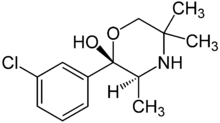Radafaxine
Radafaxine is drug candidate designated GW-353,162[1] by GlaxoSmithKline, investigated for treatment of restless leg syndrome and as an NDRI antidepressant. GlaxoSmithKline was targeting Radafaxine for regulatory filing in 2007,[2] but development was discontinued in 2006 due to "poor test results".[3]
 | |
| Clinical data | |
|---|---|
| ATC code |
|
| Identifiers | |
| |
| CAS Number | |
| PubChem CID | |
| ChemSpider | |
| UNII | |
| ChEMBL | |
| Chemical and physical data | |
| Formula | C13H18ClNO2 |
| Molar mass | 255.74 g·mol−1 |
| 3D model (JSmol) | |
| |
| |
| | |
Chemistry
It is a potent metabolite of bupropion, the compound in GlaxoSmithKline's Wellbutrin. More specifically, "hydroxybupropion" is an analogue of bupropion, and radafaxine is an isolated isomer ((2S,3S)-) of hydroxybupropion.[4]
Therefore, radafaxine builds on at least some of the properties of bupropion in humans.[2]
Effects
In various clinical trials, radafaxine has been studied as a treatment for clinical depression, obesity, and neuropathic pain. Radafaxine is described as a norepinephrine-dopamine reuptake inhibitor (NDRI).
Unlike bupropion (which has a much higher effect on dopamine reuptake), radafaxine seems to have a higher potency on norepinephrine. Radafaxine has about 70% of bupropion's efficacy in blocking dopamine reuptake, and 392% of efficacy in blocking norepinephrine reuptake, making it fairly selective for inhibiting the reuptake of norepinephrine over dopamine.[5][6] This, according to GlaxoSmithKline, may account for the increased effect of radafaxine on pain and fatigue.[7]
At least one study suggests that radafaxine has a low abuse potential similar to bupropion.[8]
References
- Tankosic T. "Restless Legs Syndrome: First Approval". BioPortfolio. Archived from the original on 2006-12-19.
- "Reviews Novel Therapeutics For CNS Disorders And Confirms Strong Pipeline Momentum". BioSpace. 23 November 2004. Archived from the original on 2007-09-28.
- Kollewe J (27 July 2006). "GSK breakthrough on bird flu vaccine". Independent.co.uk. Archived from the original on 2007-10-01.
- Radafaxine at the US National Library of Medicine Medical Subject Headings (MeSH)
- Xu H, Loboz KK, Gross AS, McLachlan AJ (March 2007). "Stereoselective analysis of hydroxybupropion and application to drug interaction studies". Chirality. 19 (3): 163–70. doi:10.1002/chir.20356. PMID 17167747.
- Bondarev ML, Bondareva TS, Young R, Glennon RA (August 2003). "Behavioral and biochemical investigations of bupropion metabolites". European Journal of Pharmacology. 474 (1): 85–93. doi:10.1016/S0014-2999(03)02010-7. PMID 12909199.
- Burch D. "Neurosciences Development Portfolio" (PDF). Archived from the original (PDF) on 2007-09-28.
- Volkow ND, Wang GJ, Fowler JS, Learned-Coughlin S, Yang J, Logan J, et al. (March 2005). "The slow and long-lasting blockade of dopamine transporters in human brain induced by the new antidepressant drug radafaxine predict poor reinforcing effects". Biological Psychiatry. 57 (6): 640–6. doi:10.1016/j.biopsych.2004.12.007. PMID 15780851.